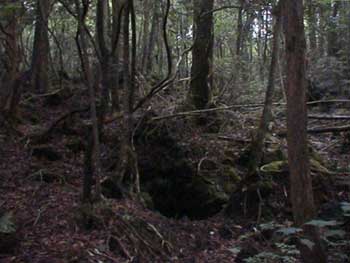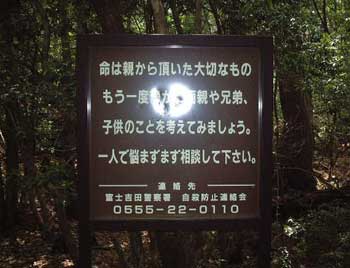For the past several years, annual suicides in Japan have exceeded the 30,000 mark. A frighteningly high figure, and one that the authorities are painfully aware of; but at the same time appear unable to reduce.
Now while not all of these unfortunate souls choose Aokigahara forest (or Sea of Trees) as the place to end their lives, a disturbingly large number do — usually somewhere between 50 to 100 people each year. The forest itself perhaps unexpectedly located at the foot of Japan’s most identifiable icon: the famous and fabulously beautiful Mount Fuji.
Whether this closeness to Fuji has any bearing on its ‘popularity’ isn’t clear, but the forest’s dense nature makes it ideal for those who really don’t want to be found. Providing the perfect location for them to fade away in a private and decidedly quiet manner.

This infamous aspect of Aokigahara means that recovery teams are regularly dispatched to comb the area for bodies, hoping to identify those that they find; allowing any next of kin an element of closure. According to Spa! magazine however, other, more unsavoury types might be getting there before them: grisly scavengers scouring the forest, hoping to find credit cards, valuables, and cold hard cash.
Yet not content with such hearsay, a reporter from the magazine claims to have taken it upon himself to explore the area, supposedly returning with a bounty that included several credit cards, a few valid rail passes, and perhaps more surprisingly, some commemorative coins.

Yet this relatively easy (if ghoulish) sounding path to prosperity is countered somewhat by Ryo Kurihara, the author of a book related to Aokigahara. Kurihara-san claims such spoils aren’t so easy to come by, and a successful trip involves considerably more that just turning up and aimlessly ambling around:
“I’ve used a handheld GPS, transceivers, goods employing the latest scientific technology and loads of people helping me and managed to find 40 bodies in the forest. However, the largest amount of cash I’ve ever found on one has been 90,000 yen [450 pound]. I’ve also found some driver’s licenses, but most of them have been ruined by being exposed to the elements for so long, and it’d be risky to try and sell those ones that aren’t damaged. I’ve also found cards and other forms of ID.â€
Not an insubstantial haul by any means, but hardly worth the considerable effort and cost. Plus lugging around such a large number of bodies could slow down proceedings considerably, creating all kinds of logistical problems. Yet despite Kurihara’s obvious experience in this area, rumours amongst locals tell of passing truck drivers stopping on their way through, boosting their salaries with a few festering finds. A practice that, if true, is a decidedly macabre take on the old maxim, ‘first come, first served’.
*Life is a gift you were given by your parents. Please think about them, the rest of your family, and any children you have. You don’t have to suffer by yourself, please give us a call (the Fuji Yoshida police counseling service) and talk to us.
Roy says
Most people who go there to die say in suicide letters that they didn’t want to inconvenience anyone so they chose a remote place. The irony is that the local government spends tons of tax payers money going out into the forest and hauling those bodies out. Best to kill yourself in a more accessible location.
Toni says
I’d reckon it’s at least more convenient and cheaper for your family than if you threw yourself in front of a train. I hear that the family gets nailed big time for monetary compensation.
Andrew Grimes JFP, JSCCP says
I would like to put forward a perspective on the real reasons behind the unacceptably high suicide Japan from Japan and so will limit my comments to what I know about here in Japan but would first like to suggest that western media reports on suicide rates in Asian countries should try harder to get away from the tendency to orientalize the serious and preventable problem of increased suicide rates here over the last 10 years by reverting to stereotypical ideas of Asian people in general.\n\nMental health professionals in Japan have long known that the prime causes for the unnecessarily high suicide rate in Japan are unemployment, the effects of bankruptcies, and the increasing levels of stress on businessmen and other salaried workers who have suffered enormous hardship in Japan since the bursting of the stock market bubble here that peaked around 1997. Until that year Japan had an annual suicide of rate figures between 22,000 and 24,000 each year. Following the bursting of the stock market and the long term economic downturn that has followed here since the suicide rate in 1998 increased by around 35% and since 1998 the number of people killing themselves each year in Japan has consistently remained well over 30,000 each and every year to the present day.\n\nThe current worldwide recession is of course impacting Japan too, so unless very proactive and well funded local and nation wide suicide prevention programs and initiatives are immediately it is very difficult to foresee the governments previously stated intention to reduce the suicide rate to around 23,000 by the year 2016 being achievable. On the contrary the numbers, and the human suffering and the depression and misery that the people who become part of these numbers, have to endure may well stay at the current levels that have persistently been the case here for the last ten years. It could even get worse unless even more is done to prevent this terrible loss of life. During these last ten years of these relentlessly high annual suicide rate numbers the English media seems in the main to have done little more than have someone goes through the files and do a story on the so-called suicide forest or internet suicide clubs and copycat suicides (whether cheap heating fuel like charcoal briquettes or even cheaper household cleaning chemicals) without focusing on the bigger picture and need for effective action and solutions. Economic hardship, bankruptcies and unemployment have been the main cause of suicide in Japan over the last 10 years, as the well detailed reports behind the suicide rate numbers that have been issued every year until now by the National Police Agency in Japan show only to clearly if any journalist is prepared to learn Japanese or get a bilingual researcher to do the research to get to the real heart of the tragic story of the long term and unnecessarily high suicide rate problem in Japan. Useful telephone number for Japanese residents of Japan who speak Japanese and are feeling depressed or suicidal: Inochi no Denwa (Lifeline Telephone Service):Japan: 0120-738-556 Tokyo: 3264 4343 Andrew Grimes Tokyo Counseling Services http://www.counselingjapan.com